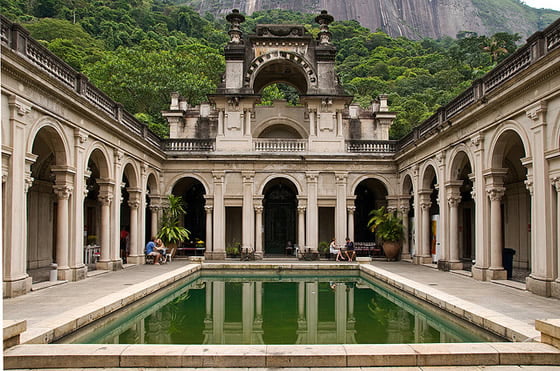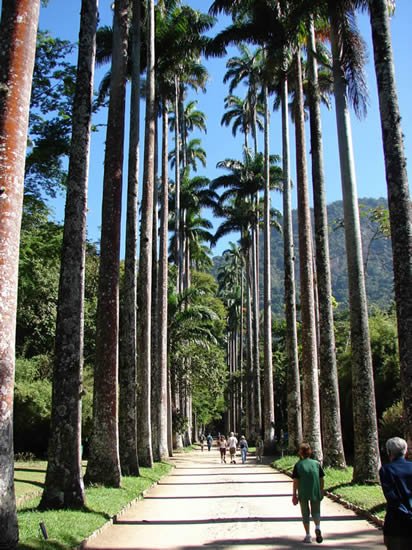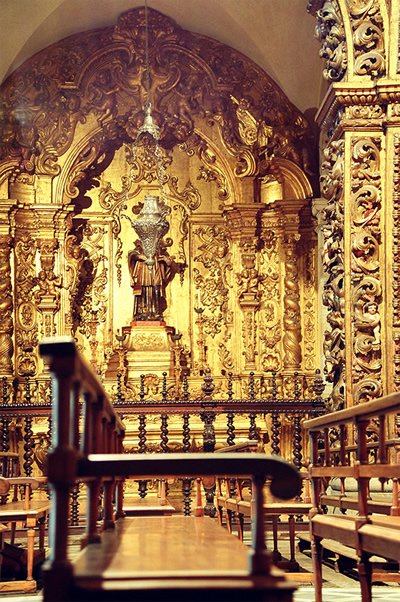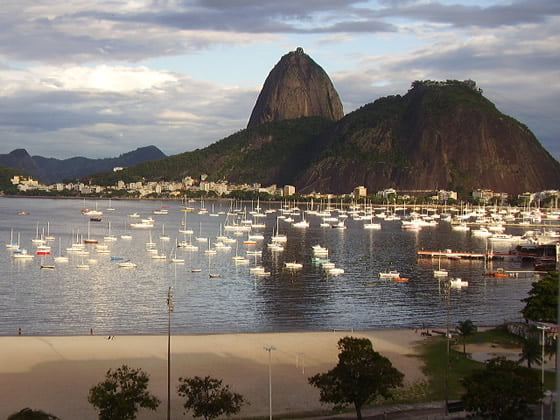1 – Christ The Redeemer
Christ The Redeemer (in Portuguese, Cristo Redentor), a monument of Jesus Christ, is a symbol of Christianity that became one of the most internationally recognized icons of Rio de Janeiro and Brazil. It is the second biggest statue of Christ in the world with 38 meters high, and 710 meters of the Corcovado Hill, and 30 metres (98 ft) wide. It weighs …See more
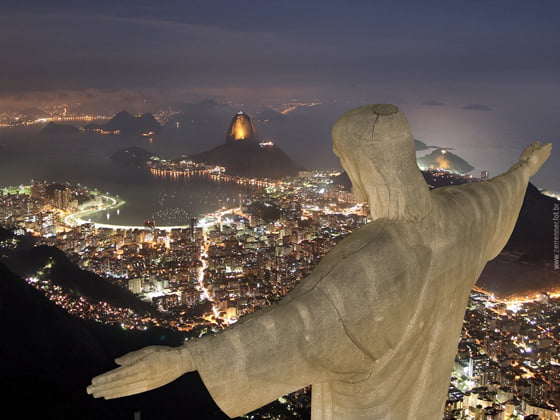 See Photos and Read More about Christ The Redeemer
See Photos and Read More about Christ The Redeemer
2 – Ipanema Beach
One of the most famous beaches of Rio de Janeiro, Ipanema is an urban beach that has a broad band of soft sand, with relatively strong waves. Symbol of music, art and bohemia, with the Morro Dois Irmãos in the background, from there you can have one of the finest views of the city. Throughout its history, the beauty and charm of this beach …See more
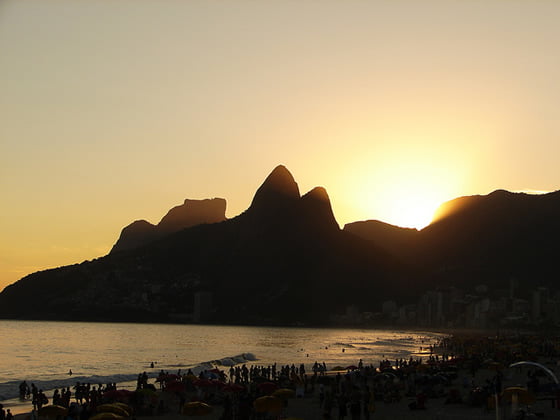 Photo by: scmartinek
Photo by: scmartinek
See Photos and Read More about Ipanema Beach
3 – Real Gabinete Português de Leitura
The Real Gabinete Português de Leitura (in English: Royal Portuguese Reading Room) has the largest and most valuable literary of Portuguese outside Portugal. Constructed between 1880 and 1887, it has more than 350,000 volumes in a library, fully computerized, which brings together rare books from the XVI, XVII and …See more
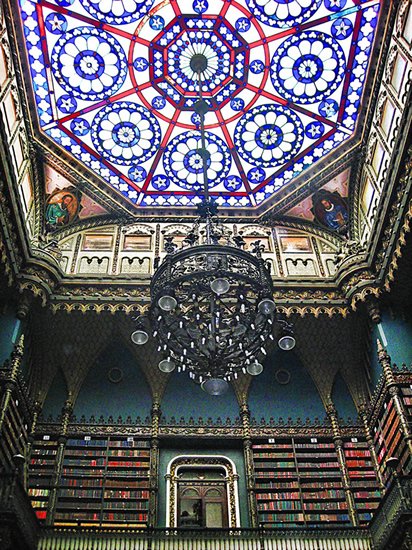 Photo by: Daniel Schwabe
Photo by: Daniel Schwabe
See Photos and Read More about Real Gabinete Português de Leitura
4 – Niterói Contemporary Art Museum
The Museum of Contemporary Art of Niterói (MAC Niterói) is a museum located in the city of Niterói, Rio de Janeiro. Designed by the architect Oscar Niemeyer, the MAC has become one of the postcards of the city. Built in 1996, the architectural complex stands out on the landscape by the boldness of its contemporary features of …See more
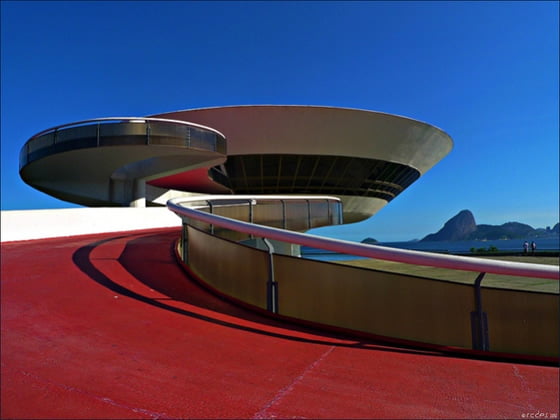 See Photos and Read More about Niterói Contemporary Art Museum
See Photos and Read More about Niterói Contemporary Art Museum
5 – Copacabana Beach
Copacabana Beach (in Portuguese, Praia de Copacabana), considered one of the most famous beaches in the world, is a mix of tradition, glamor and glory. Bounded by the Atlantic Avenue, it is home to large events such as world championships of beach soccer and volleyball, the stage of concerts that bring together millions of people and the …See more
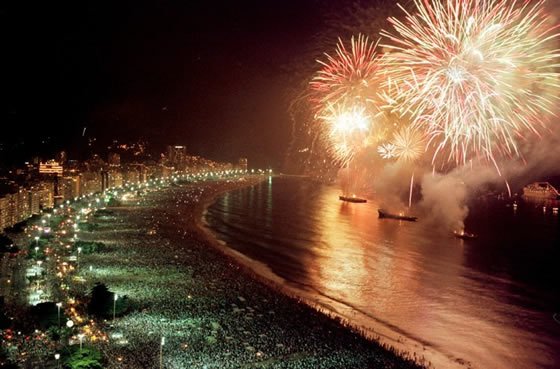 See Photos and Read More about Copacabana Beach
See Photos and Read More about Copacabana Beach
For booking options check here: Hotels in Rio de Janeiro
6 – Parque Lage
The Lage Park (in Portuguese, Parque Lage) stretches up the Corcovado Massif hiilside for 52 hectares with many species endemic to the Atlantic Rainforest, in the Tijuca National Park. Access is through double gates, with winding driveways lined with Imperial palms leading to the mansion. A perfect replica of a palazzo romano …See more
See Photos and Read More about Parque Lage
7 – Carnival Rio de Janeiro
Carnival in Rio de Janeiro is a world famous festival held before Lent every year and considered the biggest carnival in the world. The carnival parade is filled with people and floats from various samba schools. The purpose of the parade is for samba schools to compete with fellow rival schools. Each school chooses a theme to try and …See more
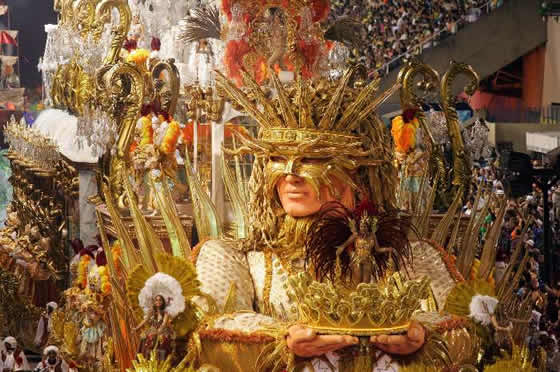 See Gallery See Photos and Read More about Carnival Rio de Janeiro
See Gallery See Photos and Read More about Carnival Rio de Janeiro
8 – Rio de Janeiro Theatre
One of the most beautiful buildings of Rio de Janeiro, the Teatro Municipal of Rio de Janeiro is the leading playhouse in Brazil and one of the most important in South America. Opened in 1909, the theatre receives the major international and Brazilian artists, from dance, music and opera. Its architecture and decoration is amazing …See more
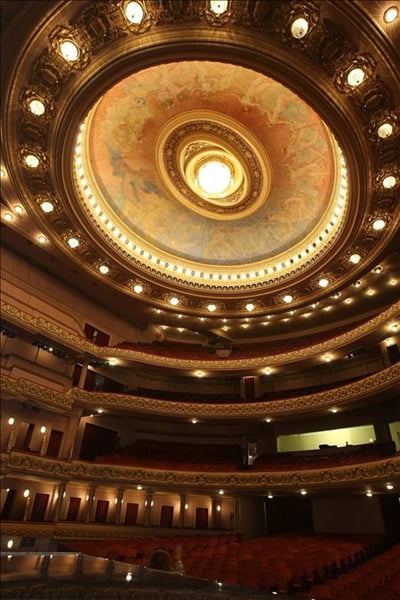 See Photos and Read More about Rio de Janeiro Theatre
See Photos and Read More about Rio de Janeiro Theatre
9 – Jardim Botânico do Rio de Janeiro
The Rio de Janeiro Botanical Garden (in Portuguese: Jardim Botânico do Rio de Janeiro) is one of the great tropical botanical gardens and arboretums of the world and one of the most beautiful and best-preserved green areas in the city. The 140-hectare park lies at the foot of the Corcovado Mountain and is an example of the ..See more
See Photos and Read More about Jardim Botânico do Rio de Janeiro
10 – Sugar Loaf Mountain
The Sugar Loaf Mountain is one of the most important natural, historical and touristic landmark of the city of Rio de Janeiro. With its unusual warhead shape, the Sugarloaf Mountain (in Portuguese, Pão de Açúcar) is a monolithic mountain of granite and quartz that rises at the mouth of Guanabara Bay. Its name is said to refer to …See more
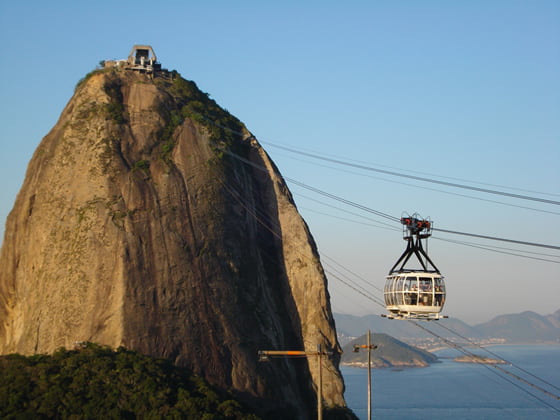 See Photos and Read More about Sugar Loaf Mountain
See Photos and Read More about Sugar Loaf Mountain
For booking options check here: Hotels in Rio de Janeiro
11 – Cathedral of Rio de Janeiro
The Cathedral of Rio de Janeiro (Portuguese: Catedral Metropolitana do Rio de Janeiro or Catedral de São Sebastião do Rio de Janeiro), built between 1964 and 1979, is dedicated to Saint Sebastian, the patron saint of Rio de Janeiro. With a standing-room capacity of 20,000 people, its 106 metres internal diameter and its 96 metres high …See more
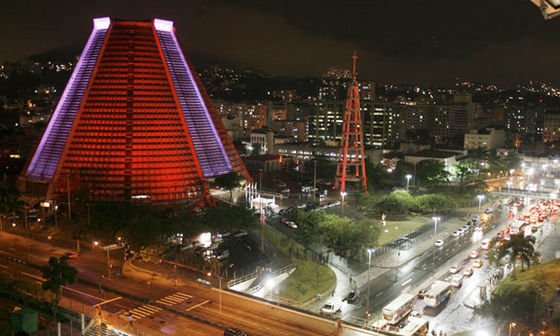 See Photos and Read More about Cathedral of Rio de Janeiro
See Photos and Read More about Cathedral of Rio de Janeiro
12 – Vista Chinesa
Vista Chinesa is a monument that is located at 380 meters high in the Tijuca Forest, at the ascent of the Alto da Boa Vista. Famous for having an oriental style gazebo, with spectacular views of the city of Rio de Janeiro, it won an award in China as the best Chinese portal outside this country. Its name dates from the reign of D. João VI …See more
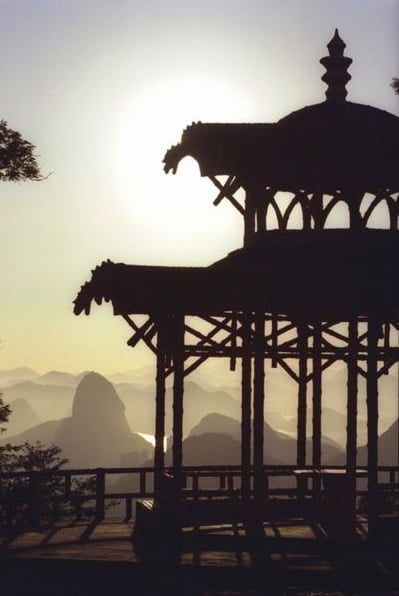 Photo by: Rafaeloliveira
Photo by: Rafaeloliveira
See Photos and Read More about Vista Chinesa
13 – Mosteiro de São Bento
The greatest wealth of the São Bento Monastery ( Mosteiro de São Bento) in Rio de Janeiro is the baroque church of Our Lady of Montserrat, completed in 1798. The facade has a mannerist style, with three arches at the entrance and a triangular pediment. Two towers topped by pyramidal pinnacles flank the entrance. Passing the entrance …See more
See Photos and Read More about Mosteiro de São Bento
14 – Pedra Bonita
Pedra Bonita (in English: Beautiful Rock) is a deforested mountain with an altitude of 696 meters, covered, in the past by Atlantic forest. From its top you can get a beautiful and closer view of Pedra da Gávea, another seaside monolit. The view you get from the top of Pedra Bonita is incredible, one of the best visuals of the city. Rio de Janeiro is known …See more
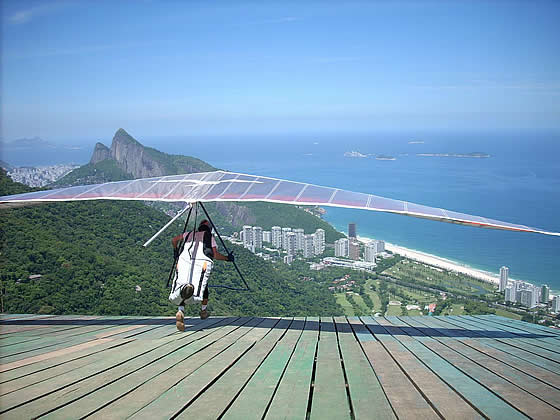 See Photos and Read More about Pedra Bonita
See Photos and Read More about Pedra Bonita
15 – Botafogo Beach
Botafogo’s beach is within Guanabara Bay, sheltered from the Atlantic Ocean by the Urca peninsula and Sugarloaf Mountain. The view of the Botafogo Bay is breathtaking. Composed by the boats of the Rio Yacht Club with the Morro da Urca and Sugar Loaf Mountain in the background, it is one of the most famous postcards of Rio …See more
See Photos and Read More about Botafogo Beach
For booking options check here: Hotels in Rio de Janeiro
16 – Confeitaria Colombo
Founded in 1854, the most charming confectionery in town is a historical and artistic heritage of Rio de Janeiro, due to its tradition, architecture and decoration. A living portrait of the Belle Époque in Rio, the Colombo Confectionery still retains much of its Art Nouveau style of the early century. Its glamorous salons, with famous Belgian …See more
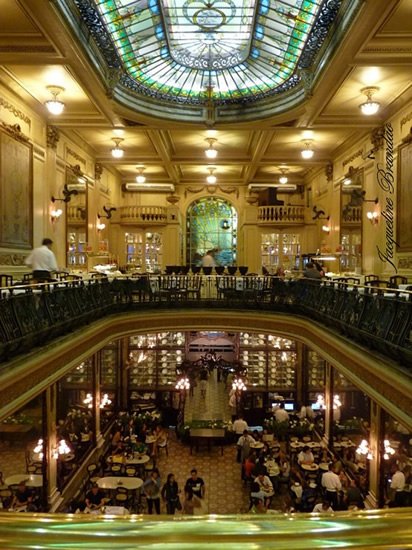 See Photos and Read More about Confeitaria Colombo
See Photos and Read More about Confeitaria Colombo
17 – Candelária Church
The Rio de Janeiro’s first church, Candelária Church, dating from 1630, went through a series of reforms to reach the current model, which opened in 1898. The Igreja Nossa Senhora da Candelária (Church of Our Lady of Candelaria) was built on the site of a chapel founded in 1610 by Antônio de Palmas and his wife in gratitude for having …See more
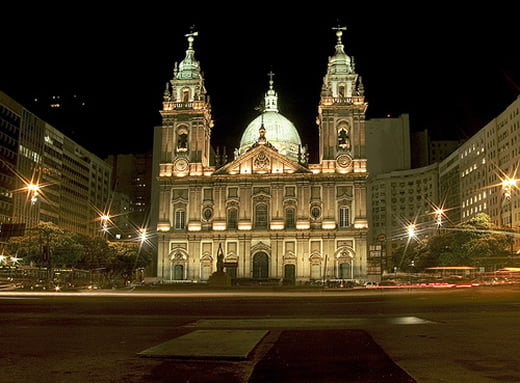 See Photos and Read More about Candelária Church
See Photos and Read More about Candelária Church
18 – Tiradentes Palace
The architecture of the Palácio Tiradentes (Tiradentes Palace), opened in 1926, stands out for mixing French and neoclassical styles, as well as for the frescoes and sculptures present in the building. The facade of the building has six 12-meter tall Corinthian columns and the whole front is decorated with beautiful sculptures. Another …See more
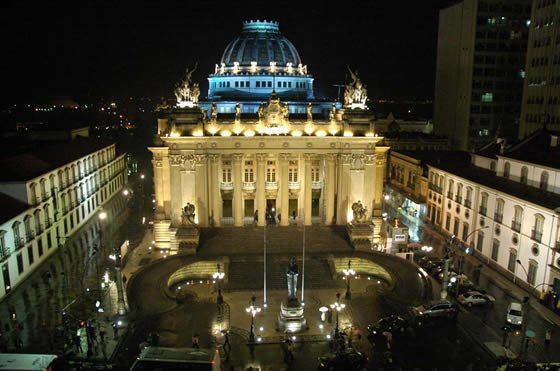 See Photos and Read More about Tiradentes Palace
See Photos and Read More about Tiradentes Palace
19 – Museu de Belas Artes
The Museum of Fine Arts, opened in 1938, originated with the group of artworks brought by D. John VI of Portugal, in 1808, and currently houses over 16,000 items. It is one of the most important cultural institutions of the country, particularly rich in 19th century paintings and sculptures. The collection includes pieces of painting, sculpture …See more
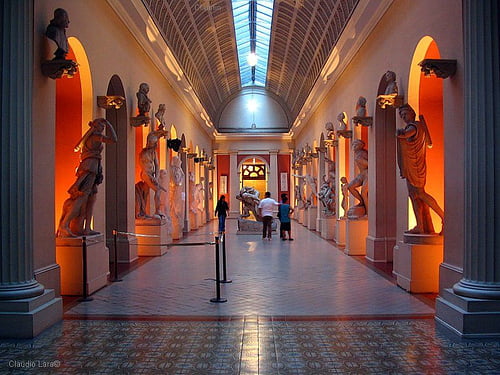 See Photos and Read More about Museu de Belas Artes
See Photos and Read More about Museu de Belas Artes
20 – Leblon Viewpoint
At the end of the famous Leblon beach, there is a scenic mountaintop viewpoint, where you can contemplate a gorgeous bird’s-eye view of Ipanema and Leblon beaches together and listen to the waves hiiting the rocks right below. It is a great spot for a romance or a date. Try climbing the viewpoint for the early morning to enjoy the sunrise …See more
 See Photos and Read More about Leblon Viewpoint
See Photos and Read More about Leblon Viewpoint
For booking options check here: Hotels in Rio de Janeiro
21 – Catete Palace
The Catete Palace (Portuguese: Palácio do Catete) is an urban mansion, once Brazil’s presidential palace, which now houses the Museu da República (Museum of the Republic) and a theatre. The property (several buildings and a large garden) is a prime example of neoclassical architecture in the country. It has a pink granite and marble façade …See more
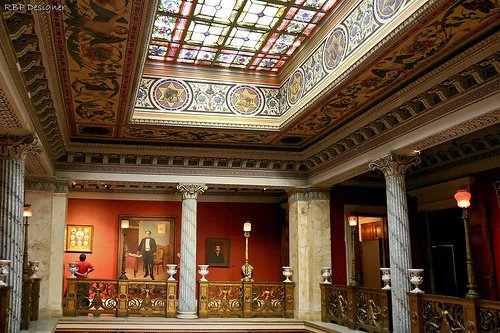 See Photos and Read More about Catete Palace
See Photos and Read More about Catete Palace
22 – Biblioteca Nacional
The Biblioteca Nacional do Brasil (in English National Library of Brazil) is the depository of the bibliographic and documentary heritage of Brazil. Considered by UNESCO as the world’s seventh national library and also the largest library in Latin America, its collections include over 9 million items, which began with the arrival of the Royal …See more
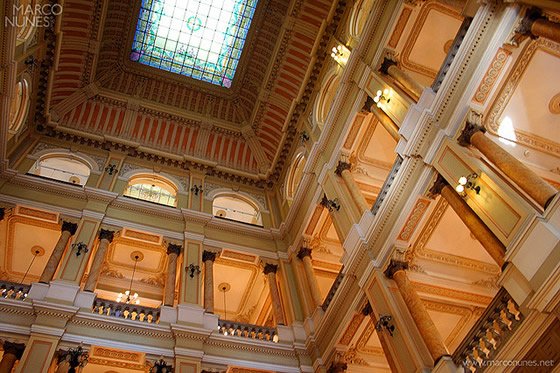 Photo by: Marco Nunes
Photo by: Marco Nunes
See Photos and Read More about Biblioteca Nacional
23 – Arcos da Lapa – Lapa Arches
The Carioca Aqueduct, located in the Lapa neighbourhood, is frequently called Arcos da Lapa (Lapa Arches) by Brazilian people. The aqueduct was inaugurated in 1750 to bring fresh water from the Carioca River to the population of the city. It is an impressive example of colonial architecture and engineering. The picturesque segment of the aqueduct …See more
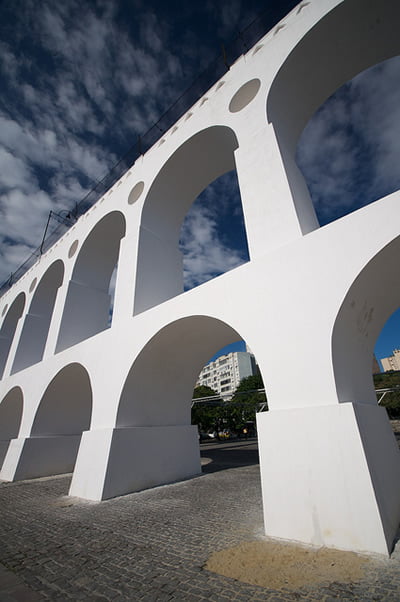 Photo by: Lá na Lapa
Photo by: Lá na Lapa
See Photos and Read More about Arcos da Lapa
24 – Quinta da Boa Vista
Quinta da Boa Vista (English: Park of the Nice View) is a public park of great historical importance in the city of Rio de Janeiro. The park was part of the gardens of the São Cristóvão Palace, the residence of the Emperors of Brazil in the 19th century. The building of the old palace hosts now the National Museum, with collections …See more
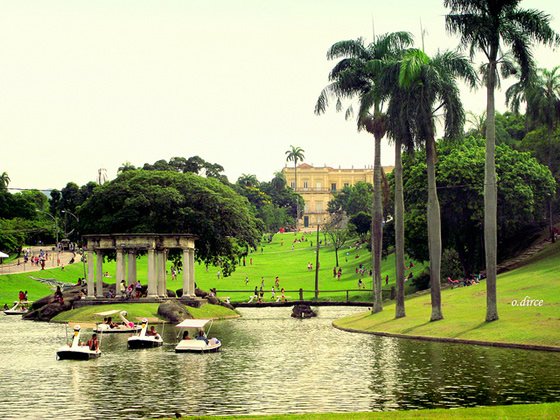 Photo by: o.dirce
Photo by: o.dirce
See Photos and Read More about Quinta da Boa Vista
25 – Our Lady of Mount Carmel Church
The Old Cathedral of Rio de Janeiro dedicated to Our Lady of Mount Carmel, (Portuguese full name: Igreja de Nossa Senhora do Monte do Carmo da antiga Sé) is an old Carmelite church which served as cathedral (Sé) of Rio de Janeiro from around 1808 until 1976. During the 19th century, it was also used as Royal and Imperial …See more
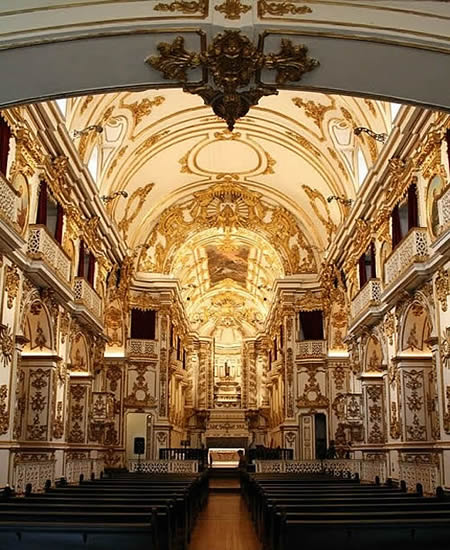 See Photos and Read More about Our Lady of Mount Carmel Church
See Photos and Read More about Our Lady of Mount Carmel Church
For booking options check here: Hotels in Rio de Janeiro

